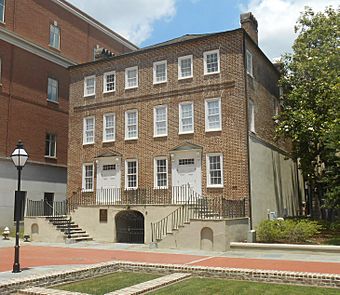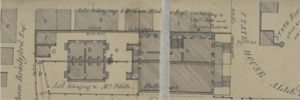Blake Tenements facts for kids
Quick facts for kids |
|
|
Blake Tenements
|
|
 |
|
| Location | 2--4 Courthouse Sq., Charleston, South Carolina |
|---|---|
| Built | 1760 |
| NRHP reference No. | 70000572 |
| Added to NRHP | August 25, 1970 |
The Blake Tenements are historic buildings located in Charleston, South Carolina. They were built a long time ago, between 1760 and 1772, by a man named Daniel Blake. He was a planter from a place called Newington Plantation.
These buildings are very important because they were added to the National Register of Historic Places in 1970. This means they are officially recognized as a significant part of American history. In 1969, the buildings were updated to be used as an extra office space for a nearby county building.
Building Design and History
The Blake Tenements are a type of building called a double tenement. This means they were designed to be two separate homes or apartments within one building. They are three and a half stories tall and built from strong brick. They also have a high brick basement underneath.
Brickwork Details
The way the bricks are laid is special. On the front of the building, called the facade, the bricks are laid in a pattern called Flemish bond. This pattern creates a checkerboard look with alternating long and short sides of the bricks. On the sides of the building, the bricks are laid in English bond, which is another strong and common pattern.
Location and Ownership
The Blake Tenements are located on a piece of land that was part of the original plan for the City of Charleston. This land was first given to Governor Joseph Blake in 1698. He was the great-grandfather of Daniel Blake, who built the tenements. Today, this spot is known as 6 & 8 Courthouse Square.
In 1967, Charleston County bought the building. They used it for their county offices.
Restoration Efforts
After Hurricane Hugo hit in 1989, the building had to be closed. Later, it was carefully restored. This restoration also included the historic Charleston County Courthouse, which is right next door.
- Robert P. Stockton, Information for Guides of Historic Charleston, South Carolina 215-16 (1985).
 | Victor J. Glover |
 | Yvonne Cagle |
 | Jeanette Epps |
 | Bernard A. Harris Jr. |




